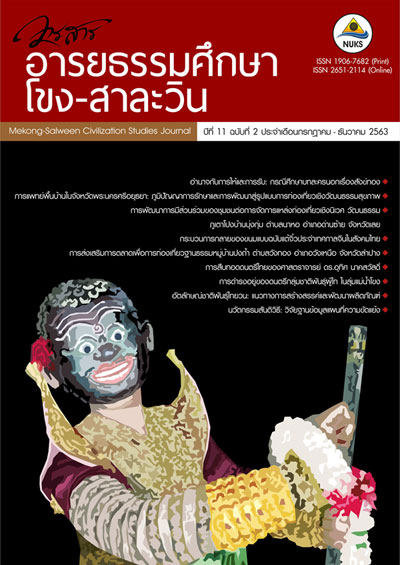Folk Medicine in Phra Nakhon Si Ayutthaya Province: Health Wisdom and Development to a Health and Cultural Tourism Model
Main Article Content
Abstract
Thailand is regarded as the leader of health tourism in Southeast Asia, both modern and folk medicines. For this reason, folk medicine has received greater interests and has been revitalized for tourism purposes. However, conventional management may be ineffective in supporting health and cultural tourism in Thailand completely. This article was conducted in order to explore the importance and current stage of health and cultural tourism in Thailand, study local wisdoms concerning cultural heritage of folk medicine in Phra Nakhon Si Ayutthaya Province, and analyze and explore possible developments of folk medicine that could help to promote the province as a health and cultural tourism destination. Data were collected from 25 pre-determined informants in Phra Nakhon Si Ayutthaya Province. Results revealed that health tourism in Thailand consisted of medical tourism and wellness tourism which could be classified into 7 types of treatment including: 1. compressing massage, 2. fire foot pedal massage, 3. wooden foot massage, 4. Thai massage, 5. lying by the fire after childbirth, 6. spraying the medicine/ sweeping medicine/blowing mantra, and 7. the treatment according to each individual’s body condition. Apart from using herbal treatments and medical procedures, moral supports, both Buddhism and Islamic beliefs, were also used. Regarding the guidelines for the development of folk medicine in Phra Nakhon Si Ayutthaya Province, it was revealed that the services and products related to folk medicine received insufficient promotional supports. Furthermore, a coordinated information center for health and cultural tourism for other localities and foreign travelers remained absent. Besides, development of health and cultural tourism should focus on constructing an online database to create a network cultural tourism which would allow tourists to plan their trips in advance. In addition, wider distribution channels for folk medicine products should also be created in order to distribute these products to consumers.
Downloads
Article Details
References
Department for Development of Thai Traditional and Alternative Medicine. (2003). Folk medicine,
the wisdom of the land. Nonthaburi: Department of Support and Health Services Ministry
of Public Health.
Department for Development of Thai Traditional and Alternative Medicine. (2014). Thai Traditional and
Alternative Health Profile, 2014 – 2016. Nonthaburi: Ministry of Public Health.
Department of Support and Health Services Ministry of Public Health. (2017). Strategy to develop Thailand as an
International health center (MEDICAL HUB) (2017 - 2026). Nonthaburi: Ministry of Public Health.
Esichaikul., R. (2014). Niche Tourism Management. Nonthaburi: Sukhothai Thammathirat University
Goodlifeupdate. (2017). 11 Steps of professional compress massage. Retrieved October 15, 2019, from
https://goodlifeupdate.com/healthy-body/health-education/62559.html
Heung, V. C. S., Kucukusta, D., & Song, H. (2010). A Conceptual Model of Medical Tourism: Implications
for Future Research. Journal of Travel & Tourism Marketing, 27(3), 236-251.
Kanthawongwara, K. et al. (2012). Study of behavior and experiences of Thai medical tourists. Bangkok:
Office of Thailand Research Fund (TRF).
Tourism Authority of Thailand. (2019). Tourism Authority of Thailand’s (TAT) Corporate Plan 2019.
Bangkok: Tourism Authority of Thailand.
Weerakit, N. (2018). A study of the linkage between medical tourism, spa and wellness tourism in Phuket.
Songkla: Prince of Songkla University.
Yarasai., A. (2016). Revival of the Northeastern folk medicine, case study of Chianghian community
Mahasarakham province. Nakhonphathom: Mahidol University.


